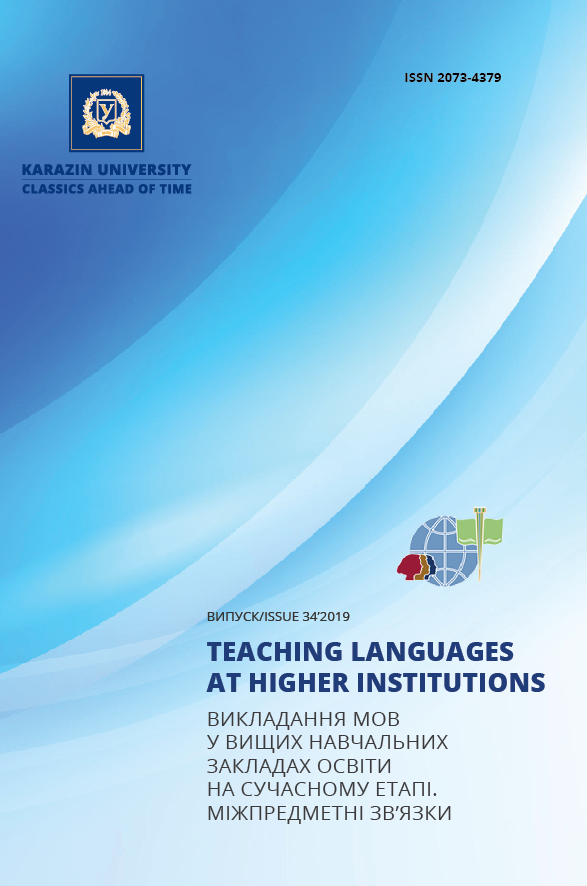To the issue of vocational english syllabus design for sustainable foreign language education
Abstract
The article considers English language syllabus design for non-linguistic faculties on the basis of positive experience of some European countries. Current vocational foreign language education is determined by the global context of education and employment on the whole: labour force mobility, life-long learning and sustainable social and economic development. Communicative competence in a foreign language has become a prerequisite of sustainable education nowadays. In order to establish effective foreign language education, Ukraine must bring the quality of its education to the European standards, taking into account positive foreign experience. Analyzing English language teaching at non-linguistic universities of our country, we see the problems related to the curriculum and syllabus design. The absence of integration of foreign language teaching at secondary school and the requirements to the communicative competence in English of non-linguistic students fail to provide the sufficient level of foreign language education in the country and as a result, the quality of higher education. The discrepancy between the low initial level of proficiency in English of first-year students alongside with the syllabus designed for mastering this foreign language for specific purposes is a problem, hard to cope with both for teachers and students. Windows User decision alongside with gradation of coursesWindows User according to their level, so that the students can attain the necessary communicative skills to be able to learn English for professional purposes, read specialized literature sources, participate in discussions and make presentations or communicate business ideas in a written form. The analysis of the syllabi of some European universities shows differential approach in teaching FL, taking into account the students’ needs so that they actively and effectively participate in the study process and show sufficient performance.
Downloads
References
Bialik, M. (2015). Skills for the 21st Century: What Should Students Learn? Boston, Massachusetts: Centre for Curriculum Redesign [in English].
Borisko, N.F. (2006). Novye tipovie program po inostrannym yazykam dlia vuzov i ikh osobennosti [New standard syllabi of foreign languages for universities and their peculiarities]. Inozemni movy [Foreign languages]. Kyiv: KNLU, 6, pp. 3–9 [in Russian].
Communication in English for Exchange Students. Single subject course. (2018). Linkoeping University: Faculty of science and engineering [in English].
Curriculum for the bachelor program Economy of the Enterprise [Curriculum fьr das Bachelorstudium Betriebswirtschaft] (Version 2014). (2014). University of Vienna [in German].
EF English Proficiency Index: executive summary. Education First. (2018). Available: www.ef.com /epi [Accessed March 12, 2019] [in English].
Ismailov, E.E. (2002). Shvedskaya model dovuzovskoy professional’noy podgotovki [The Swedish model of pre-university vocational training]. Karlskrune: municipal gymnasieskola named after Chapmen [in Russian].
Lyst Ministerstva osvity i nauky Ukrayiny “Pro orhanizatsiyu vyvchennya humanitarnykh dystsyplin” № 1/9-120 dated March 11, 2015 [The Letter of the Ministry of Education and Science of Ukraine “On the organization of learning the Humanities” №1/9-120 dated March 11, 2015]. (2015). Available at: http://osvita.ua/legislation/Vishya_osvita/46343/ [Accessed February 17, 2019].
Movchan, L.H. (2012). Rozvytok zmistu skil’noii inshomovnoii osvity v Korolivstvi Shvetsia [Development of the content of school foreign language education in the Kingdom of Sweden]: Candidate’s Thesis. Kyiv: The Open University of Human Development “Ukraine” [in Ukrainian].
Nakaz MON Ukrayiny “Pro orhanizatsiyu vyvchennya humanitarnykh dystsyplin za vil'nym vyborom studenta” 642 dated July 09, 2009 [The Order of the Ministry of Education and Science of Ukraine “On the organization of free-choice learning the Humanities” 642 dated July 09, 2009]. (2009). Available at: http://old.mon.gov.ua/ua/about-ministry/normative/147 [Accessed February 22, 2019] [in Ukrainian].
Pasichnyk, O.S. and Pasichnyk, O.O. (2015). Optymizatsiya protsesu inshomovnoyi pidhotovky studentiv nemovnykh spetsialnostey: dydaktyko-metodolohichnyy aspect [Optimization of foreign language training of students of nonlinguistic specialties: didactic and methodological aspect]. Naukovyy visnyk Chernivetskoho universytetu, Seria: Pedahohika ta psykholohiya [Scientific Bulletin of Chernivtsi University. Series: Pedagogy and Psychology]. Chernivtsi, 734, pp. 101–109. Available at: http://elar.khnu.km.ua/jspui/handle/123456789/4049] [Accessed March 15, 2019] [in Ukrainian].
Prevedel, A. (2003). Values and Beliefs: The World View Behind Curriculum. The Annual Review of Adult Learning and Literacy. 3, pp. 8–13 [in English].
Ramkova prohrama z nimetskoyi movy profesiynoho spilkuvannya dlya vyshchykh navchal'nykh zakladiv Ukrayiny [Curriculum Framework for the German professional communication in higher educational institutions of Ukraine]. (2014). Azzolini, L.S., Amelina, S.M., Hamanyuk, V.A. and Zhdanova, N.S. (Comps.). Kyiv: Lenvit [in Ukrainian].
Savchenko, O.Ya. (2010). Uminnia vchytysia yak kliuchova kompetentnist’ neperervnoii osvity [The Ability ty learn as a key competency of sustainable education]. Available: http://dosvid-loippo. at.ua/load/pisljadiplomna_osvita/savchenko_o_ja_quot_um [Accessed July 14, 2016] [in Ukrainian].
Turchyn, A. (2017). Some aspects of advanced foreign language training of students of non-special departments at high schools. Ternopilskyj nacionalnyj pedagogichnyj universytet imeni V. Gnatyuka: Naukovi zapysky [Ternopil Volodymyr Hnatiuk National Pedagogical University: Scientific Notes]. Ternopil, 1, pp. 184–192 [in Ukrainian].
Zahalnoyevropeyski Rekomendatsiyi z movnoyi osvity: vyvchennya, vykladannya, otsinyuvannya [The Common European Framework of Language Portfolio: learning, teaching, evaluation]. (2003). Nikolayev, S.Yu. (Ed.). Кyiv: Lenvit [in Ukrainian].

